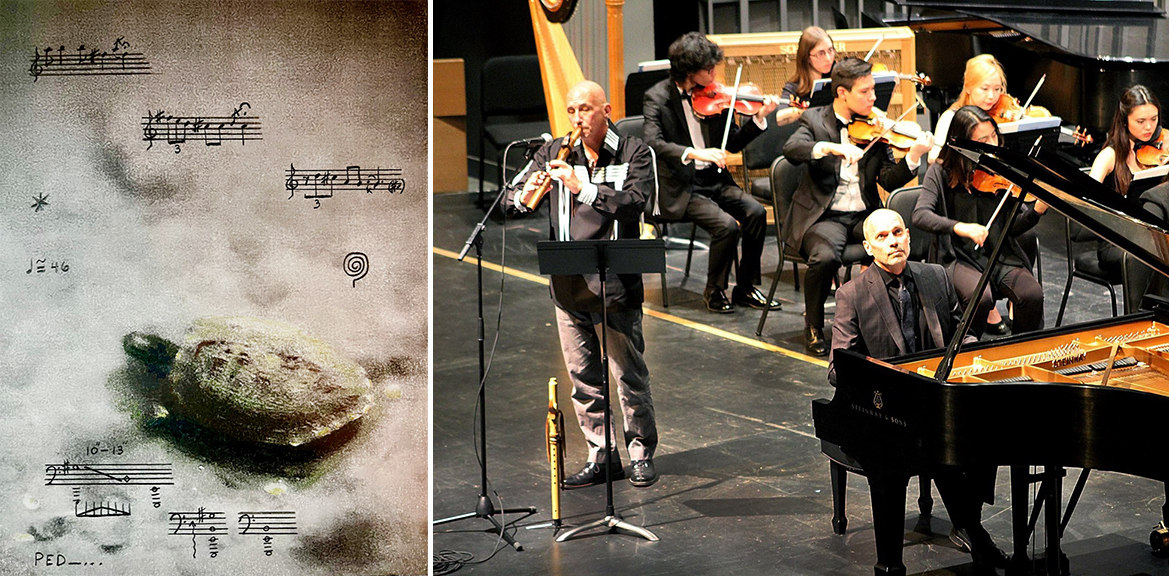
The Glenn Korff School of Music presents “The Way of Mountains and Desert: Celebrating the Music of Ron Warren” on Monday, Sept. 26 at 7:30 p.m. in Kimball Recital Hall.
The concert, featuring native flutist and composer Ron Warren and Marguerite Scribante Professor of Piano Paul Barnes, is free and open to the public. The concert will also be live webcast. Visit https://music.unl.edu/webcasts the day of the performance for the link.
Warren is an Echota Cherokee musician currently based in central Florida. An accomplished and innovative Native American flute player, he is also highly regarded as a song writer, composer/arranger and music/cultural educator.
The concert will feature the world premiere of Warren’s “The Way of Mountains and Desert.”
“Ron wrote this glorious piece, and I cannot wait to share it with the musical community of Lincoln,” Barnes said. “The piano work musically explores the intimate and prayerful relationship humans can have with creation.”
Barnes received a Hixson-Lied College of Fine and Performing Arts Faculty Research/Creative Activity Grant to support the commissioning of the piece.
“This project wouldn’t exist without the invitation from Paul to make a big new piece for him this season,” Warren said. “We’ve been working together for a number of years now. He’s played music of mine before, and I love his playing. I love the lyricism and the expressiveness in his playing. The piece, as it turned out, essentially is this music of place, which is how I often operate. And it’s also coming out of my flute playing. In our tradition, it’s very flexible. Improvisation is an important part of it, so there are a couple of ways I tried to build that into the experience for Paul also, so he has a lot of creative options about how to structure things, how to approach things, along the way.”
“It’s a very beautiful and unique score,” Barnes said. “It’s inspiring when the score itself is visually stunning, but then you hear the sound world that’s created with all of the beautiful improvisatory options. Improvisation has always been an important part of my musical life, and I’m excited to improvise as part of this upcoming concert.”
Barnes was interested in the connection to creation.
“My inspiration in commissioning this work from Ron deals with the essence of creation and our part in creation, and most importantly, our participation in creation,” Barnes said. “What I wanted my performance to reveal was a much more ancient view of creation. That’s a part of my Orthodox tradition where we affirm the ancient beauty of creation and actually participate in creation as a part of us. We have the ability as human beings to actively participate and rejoice in that creation. And all that exists because of divine love—and we humans have the ability to live and participate in that love. And ‘The Way of Mountains and Desert’ has, at its compositional core, the ‘Love Song to This Earth,’ the lyrical third movement that becomes the musical basis for the entire composition.”
Warren and Barnes first met more than 20 years ago during a performance of Philip Glass’s Piano Concerto No. 2 “After Lewis and Clark” with the North Dakota Symphony.
“The conductor was a big Philip Glass fan and also a big Native American music fan,” Barnes said. “This piece brought both of those worlds together, and so that’s where we first met. I had such a wonderful time working with Ron so that whenever I get the concerto booked, I always insist they fly in Ron from wherever he happens to be and make sure he’s the native flute player.”
He wasn’t aware of Warren’s compositions until he wrote “Distances Between 2” for him in 2018.
“I started putting that on my recitals and just absolutely loved it,” Barnes said. “It’s a beautiful, short seven-minute work.”
In addition to the premiere of “The Way of Mountains and Desert,” for solo piano, the program on Sept. 26 includes “Sacagawea” from Glass’s Piano Concerto No. 2,” featuring Barnes, Warren and Danielle Meier on bass, as well as “Distances Between 2” and “Beads,” Warren’s work for native flute and piano.
It also includes “Lunas y Agua #1” featuring Warren on native flute.
“Those are very much a musical place,” Warren said. “In some of our indigenous traditions, people keep winter counts, where here is a visual representation of important things that happened over the course of the year. It literally covers a full year with one piece for each of the 13 lunar cycles within the year, and it’s very much a structured improvisation piece.”
Warren said he and Barnes are a good fit.
“I was fortunate to find someone with the flexibility that Paul has and his commitment to new music that he’s going out there finding ways to commission major pieces from Philip Glass and things like this. And then he’s got all the technique in the world,” he said. “It was a wonderful feeling of, wow, this is a person that I vibe with as a person, vibe with as an artist, vibe with at some level spiritually as well. It just felt like a really, really good fit all the way around.”
Barnes is eager to have audiences celebrate the music of Warren at this concert.
“I’ve always loved working with Ron and wanted to be able to create an evening where his music was paramount,” he said. “And Ron’s playing is so beautiful, I wanted my students to hear music that has much more of an improvisatory element to it. And for all of my musical fans here in Lincoln, you won’t want to miss this unique event!”